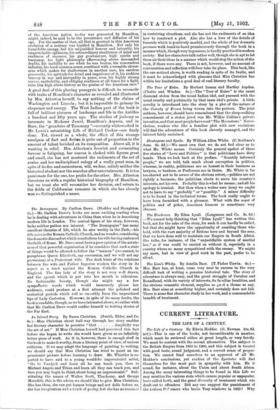- her literary character to perceive "that simplicity was the art
of art." If Miss Christian herself had perceived this fact 'before she began to write she would have given us an infinitely better piece of work. As it is, however, there is enough stuff in the book to make it worthy, from a literary point of view, of serious .criticism. If we may adapt the language of painting to writing, we should say that Miss Christian has tried to paint an im- pressionist picture before learning to draw. Mr. Whistler is re- ported to have said to a young would-be impressionist artist, "Go to Vandyck and learn all he can teach you, then to Michael Angelo and Titian and learn all they can teach you, and then you may begin to think about being an impressionist." Sub- stituting the names of Walter Scott, Thackeray, and George Meredith, this is the advice we should like to give Miss Christian. She has ideas, she can put human beings and not dolls before us, she has imagination and a touch of pastry, but she has no resource in contriving situations, and she has not the rudiments of an idea how to construct a plot. Also she has a love of the details of funerals which is positively morbid, and the whole of her dramatis personae walk hand-in-hand promiscuously through the book in a manner which, though very ingenuous, is hardly practised in modern society. But her characters talk rather well, though she is apt to let them air their ideas in a manner which would stop the action of the book, if there were any. There is not, however, and no amount of conversation and reflection will ever take its place. This book, like the one noticed above, is worth reading in spite of its faults, and it must be acknovkedged with pleasure that Miss Christian has within her limitations a good deal of real literary faculty.










































 Previous page
Previous page